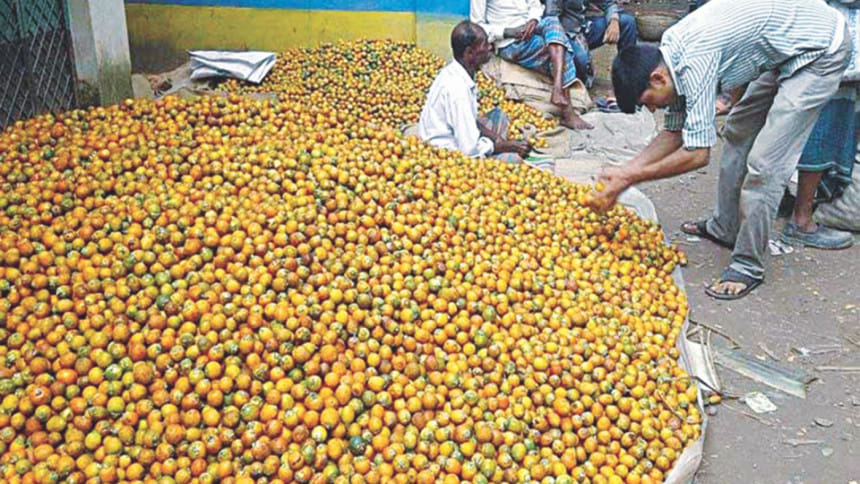Betel nut cultivation a blessing for Narail farmers

Ten years ago, commercial production of betel nut in Narail was a small-scale affair. But good demand and healthy market prices, combined with the relative quality of Narail's betel nut crop, have encouraged more farmers to grow it. Currently around 2000 seasonal areca businessmen are active in the district, with markets for the nut to be had across the country.
“Since my father's time we have had betel nut palms around our house,” says farmer Noyon Sheikh from Aarenda village in Lohagara upazila. “Seven years ago, we planted betel nut palms on a further 22 acres. Some of those produced nuts from last year; this year almost all the trees are productive. It costs around Tk 17,000 to manage the plantation, but I hope to make around Tk 1.1 lakh from betel nut sales.”
“Every twenty nuts sells for up to Tk 250,” says Zainul Abedin, a local betel nut trader. “I buy them from various markets and farmers across Narail district and sell the nuts to other wholesalers from elsewhere in the country. The profits are good.”
“I have been trading betel nuts in Narail for fourteen years now,” says a visiting businessman, Nowsher Ali from Charbari village in Lakshmipur's Raipur upazila. Every season he purchases more than fifteen truckloads of the nut from Narail, he says.
According to the agriculture department, 645 hectares in Narail is currently dedicated to commercial areca production, with a harvest target set at 1,735 tonnes. Betel nut is also grown for household consumption.
Commercial plantations are best established in dry soil from July to October, with new saplings producing nuts after around seven years, with trees productive for up to forty years thereafter. A tree will produce up to 500 nuts per year. The peak harvest season runs from September through to November.
Local farmers report that betel nut palms are not expensive to grow in comparison with other crops. While the first few years from planting are a little trying, principally in protecting saplings from being eaten by grazing cattle, after that the trees are largely maintenance-free. A little fertilizer will help young betel nut palms, and some application of pesticide can prevent insect attack when the arecas are producing nuts.
“Narail's soils are rather suited to betel nut production,” says the deputy director of the district's Department of Agriculture Extension, Sheikh Aminul Haque. “As the crop is profitable, many farmers are now establishing gardens on previously fallow land.”

 For all latest news, follow The Daily Star's Google News channel.
For all latest news, follow The Daily Star's Google News channel. 



Comments